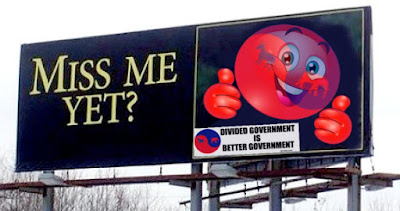We're now six months into One Party Rule - Republican Unified Government.
Hey! Remember all the social and mainstream media cries, lamentations, rending of garments and gnashing teeth about gridlock, divided government and partisan obstruction over the last six years? Guessing everyone is now enjoying our brand spanking new unified government! What? No? Huh.
Look, the Dividist is not one to say "I told you so..." Oh wait. Yes he is...
Americans may have a short memory, but we are once again learning to appreciate the finer points of a politically divided government. It's encouraging to see my fellow citizens coming to that realization much sooner than during the early years of unified government under either Republican Bush or Democratic Obama administrations.
Perhaps this is a good time to step away from the day-to-day West Wing tweet-storm / soap opera and consider some recent thoughtful essays on the nature and benefits of divided government.
Ron Brownstein, previously at CNN, now with The Atlantic, offers a nice historical overview of divided vs unified governments in the modern era, then uses the on-going Republican health care fiasco to explain "Why one-party government doesn't last":
"One party will hold unified control of the White House and Congress for just 14 of the 50 years from 1969 through 2018. Over that half century, no party has maintained simultaneous control for longer than four years-during Jimmy Carter's presidency and the middle years (2003 through January of 2007) of George W. Bush's...
Bill Clinton and Barack Obama each arrived in office with unified control, just as Trump has, but then lost it in their first midterm elections (1994 and 2010, respectively). In fact, counting 2006, when a voter backlash against Bush swept Democrats to majorities in both chambers, each of the past three times when one party held unified control heading into a midterm election, the voters have revoked it...
But the Congressional debate over the highly contentious health care bill points to another reason why neither party lately has sustained complete control for very long. In an era of intense polarization, unified government unavoidably steers the governing party toward the demands of its most ideological elements, infuriating the other party and unsettling swing voters. The more the party in power accomplishes the more it antagonizes the voters outside of its coalition; meanwhile, its own voters are often discouraged by the compromises and setbacks that inevitably accompany governing. Call it the paradox of unfettered power.
Read the whole thing, but the money quote is right here: "Call it the paradox of unfettered power." They just can't help themselves. Democrats lost their veto-proof unified government as a direct consequence of left-wing overreach steamrolling Obamacare on a pure partisan vote. Ignoring that lesson, Republicans are hell-bent on making the exact same mistake today. The current GOP is a parody of everything they complained about during Democratic unified government control under the Obama administration and are likely to pay the same price. The stage is set for history to repeat.Democrats suffered from this paradox when they enacted the ACA (and other Democratic priorities) under President Obama only to lose control of the House in the next election. Now Republicans could be courting the same type of backlash for their efforts to repeal the law seven years later under President Trump."
That is a very cool, and telling, bit of history right there. https://t.co/XRc1p8BqDX— Ronald Brownstein (@RonBrownstein) July 19, 2017
Stephen Slivinski - a United Coalition of the Divided Honor Roll inductee has long been a favorite of this blog. Earlier this year he invoked Lego Batman to predict the problems this unified GOP government would face internally and in particular with the promise to "repeal and replace" Obamacare in "What 'The Lego Batman Movie' can teach us about American politics":
"Batman spends the film realizing he needs the Joker. Without him, he is just throwing punches blindly in the dark, assuming he's throwing punches at all. This is a lot like the behavior of politicians. Policies that they rail against when proposed by their partisan adversaries are often embraced or, at the very least, aren't resisted as hard when a leader of their own party proposes it. This is especially true if the party of which they are a member controls both the legislative and the executive branch of the government...
You could argue we're seeing a version of that now in the debate over how to repeal Obamacare. The House GOP proposal keeps intact the fundamental premises of the Affordable Care Act and heaps on a number of new big-government ideas. Sure, this moment is one without historical precedent and it's not quite clear how it will turn out. There are a number of solid limited-government Republicans who could still trip this up. It's simply too soon to tell...
It's a sentiment the Dividist has echoed many times on this blog and twitter:When Republicans don't have an opposition (their "Joker") they lose something that makes them motivated to fight Big Government. Should we expect the Trump years to be any different? I'd like to hope so, but I'm not optimistic."
@ggreenwald D's behave like principled D's on civil liberties when R is POTUS. R's like principled R's on debt & deficit when D is POTUS.— The Dividist (@Dividist) July 28, 2013
Ken Fisher is a money manager and investment guru, eschewing politics and politicians in general but opining on their market impact. Also a Dividist favorite, we have frequently cited his views on the market benefits of gridlock and divided government. He make the case that the dysfunctional Trump administration, despite enjoying a unified partisan government, is still functioning as a divided government with salutary market effects in "The State of Gridlock":
"All the squabbling and posturing amounts to gridlock, which lowers legislative risk and makes stocks happy—even as people mostly hate it. The less gets done, the less markets have to worry about sweeping change creating winners and losers...
An Obamacare replacement may still eventually pass but, if so, likely in much reduced form. Bipartisan support for a compromise bill is also possible—though a low likelihood—and they probably wouldn’t agree on anything radical. Some see this as negative, believing the ACA is poison and has to go. Others see it as positive, fearing the disruption that could accompany repeal if it leads to a big increase in uninsured patients and upheaval for insurers. This is obviously a matter of debate, but the thing is, stocks price in all these opinions, and they’ve decided to rally. Health Care has outperformed bigly this year. Why is always harder to know than what, but we suspect it’s because the uncertainty associated with potential change is fading. For better or worse, markets know what they’re dealing with. Love or loathe the ACA, stocks have done fine since it passed in March 2010..
The Dividist is dubious whether a fractured GOP will continue to function as a properly divided government. Both Democrats and Republicans are fond of arguing that their "big tent" party adequately encompasses a diversity of perspective and effectively functions as a divided government. The upcoming budget, debt ceiling, and tax reform debate will test this proposition for Republicans. If we see a unified GOP proffer expanding deficits, spending, and debt, we'll know they've fallen into the same big government hole we saw during the Bush years.Gridlock eases this risk, and investors now have a pretty good sense of it—even more than they did when Trump took office. One argument back then was that despite the Republicans’ divisions and slim edge, Art of the Deal author Trump could strike bargains galore. Six months later it’s clear this hasn’t happened and his political capital has fallen, giving lawmakers less incentive to fall in line. The less businesses and investors have to fear property rights changing, the more willing they usually are to take risk—and risk-taking is what ultimately powers investment, economies and markets."
Despite all evidence to the contrary, Donald Trump may not be enough of a "Joker" for limited government "Batman" Republicans to hold true to their principles. Why risk "the paradox of unfettered power"? Best to divide this government properly in 2018.





No comments:
Post a Comment